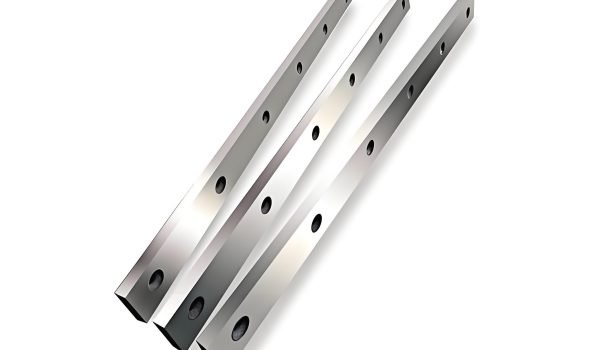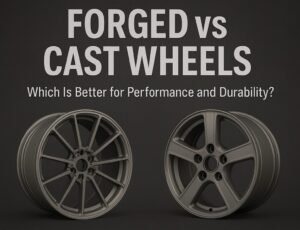Sheet metal fabrication is a big deal in making things. It takes flat metal sheets and turns them into useful stuff. You see it in cars, houses, and even kitchen gadgets. But what is it really? How does it happen? Why is it so important? In this guide, we’ll explain everything simply. We’ll talk about types, steps, industries, benefits, services, and new ideas. By the end, you’ll get sheet metal fabrication completely. Let’s jump in!
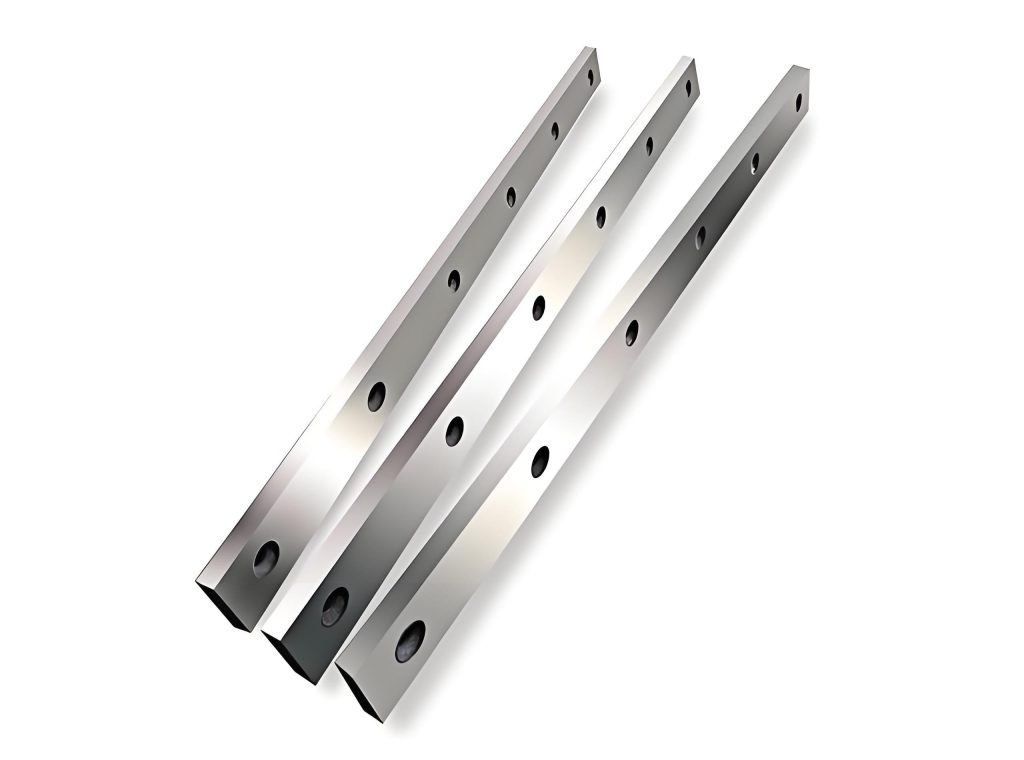
What is Sheet Metal Fabrication?
Sheet metal fabrication is about shaping thin metal sheets. These sheets are super thin, usually 0.006 to 0.25 inches. People cut, bend, or join them to make parts. The result? Strong, exact pieces for all kinds of things. Common metals are steel, aluminium, copper, and brass. Each metal has its perks. For example, aluminium is light, and steel is tough.
This process is very flexible. It makes parts for cars, planes, or home tools. It’s like a mix of skill and cool machines. Doing it right is super important for good results. A small mistake can mess up the final piece. That’s why being careful matters.
Types of Sheet Metal Fabrication
Sheet metal fabrication has different styles. Each style has a special job. Here’s what they are:
1. Cutting
Cutting splits metal sheets into smaller bits. It’s often the first thing done. Tools like lasers, plasma cutters, or water jets do it. Lasers are super sharp and quick. Plasma cutters work great for thick metal. Water jets use water to make clean cuts.
2. Forming
Forming changes the metal’s shape without cutting. Bending is a big part. Machines called press brakes make corners or angles. Stamping presses shapes or patterns into the metal. Forming makes parts fit the plan perfectly.
3. Joining
Joining sticks and metal pieces together. Welding is the main way. It melts metal edges to connect them. Other ways include riveting or brazing. Joining makes strong, solid parts.
4. Finishing
Finishing makes parts look nice and last longer. This includes polishing, painting, or powder coating. It stops rust and wear. It also makes things look cool.
Each style is like a piece of a puzzle. Together, they build awesome stuff.
Key Steps in Sheet Metal Fabrication
Lots of steps make sheet metal fabrication work. Each one needs care and know-how. Here are the main ones:
1. Shearing
Shearing cuts straight lines in metal. A blade slices the sheet. It’s quick and doesn’t cost much. Shearing gets metal ready for other steps.
2. Laser Cutting
Laser cutting uses a strong laser beam. It cuts fancy shapes super accurately. Computers control it for perfect cuts. It works on metals like steel or aluminium.
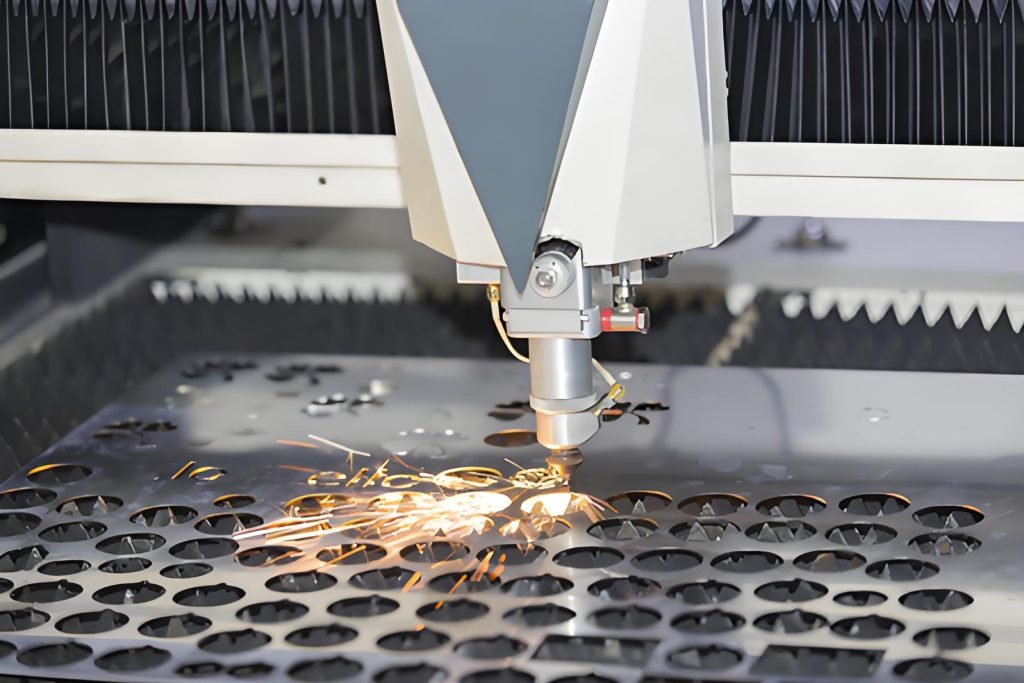
3. Punching
Punching makes holes or shapes. A punch press pushes a tool through the metal. It’s great for patterns or slots. Punching is fast for big jobs.
4. Bending
Bending makes metal into angles or curves. Press the brakes and push the metal to shape it. This makes things like brackets or boxes. Being exact stops cracks.
5. Welding
Welding sticks metal pieces together. It melts their edges to join them. Ways include MIG, TIG, or spot welding. Each works for different metals or sizes. Welding makes parts super strong.
6. Assembly
Assembly puts parts together. This can use welding, rivets, or screws. Getting it lined up right is key. It makes sure the final piece matches the plan.
7. Powder Coating
Powder coating adds a tough layer. Dry powder is sprayed on and then baked. It makes a smooth, strong finish. This stops scratches and rust.
8. Rolling
Rolling curved metal into round shapes. Machines roll the sheet to make cylinders or tubes. It’s great for pipes or tanks.
9. Deburring
Deburring smooths rough edges. After cutting, metal can have sharp bits. Deburring makes parts safe and clean.
These steps work together. They turn flat metal into real products.
Industries That Use Sheet Metal Fabrication
Sheet metal fabrication helps tons of industries. It’s super useful everywhere. Here’s where it’s a big deal:
1. Cars
Cars use sheet metal for bodies, frames, and exhausts. Steel and aluminium are used a lot. They’re strong but not too heavy. Fabrication makes cars safe and good-looking.
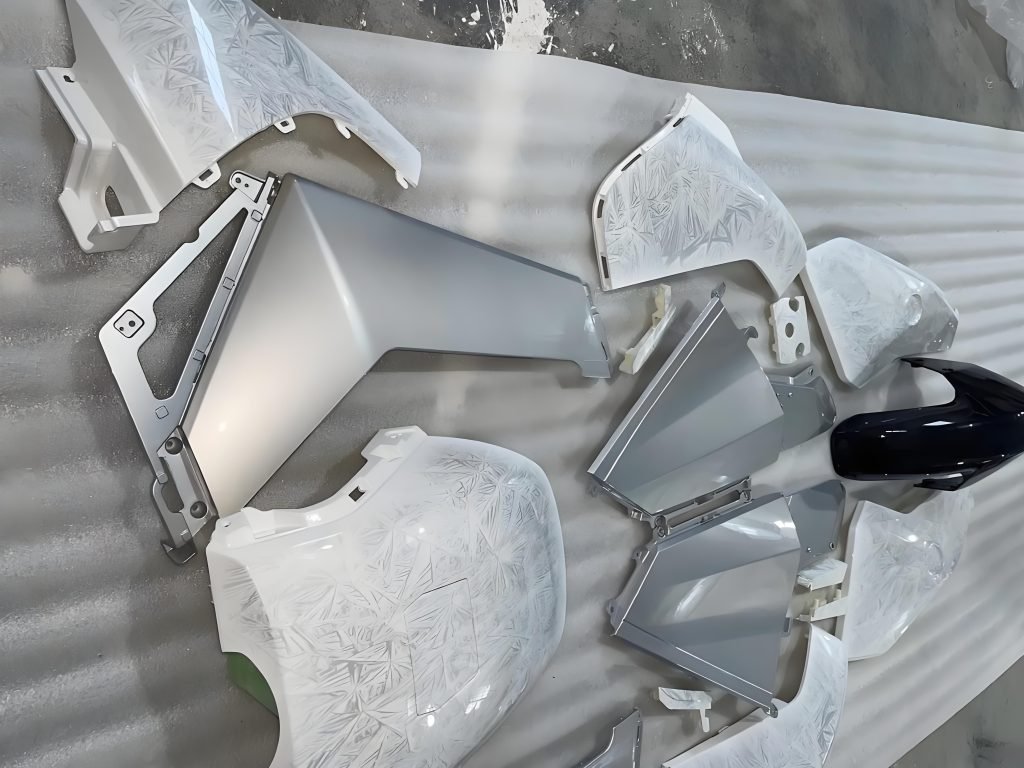
2. Planes
Planes need light, tough parts. Sheet metal makes wings, bodies, and engine bits. Aluminium is great because it’s light. Fabrication follows strict rules for safety.
3. Building
Buildings use sheet metal for roofs, air systems, and walls. Steel is strong for these jobs. Custom parts fit special building designs.
4. Electronics
Electronics need cases to protect parts. Sheet metal keeps things safe and cools them down. It’s made exactly to fit tiny pieces.
5. Medical
Medical tools need clean, strong materials. Sheet metal makes surgical tools and machine cases. Stainless steel doesn’t rust, which is perfect for hospitals.
6. Energy
Energy systems use sheet metal for solar panels, wind turbines, and pipes. Parts need to handle tough weather. Fabrication makes them last.
7. Home Goods
Things like fridges, ovens, and microwaves use sheet metal. It’s tough and looks nice. Fabrication makes these items work well and look good.
8. Farming
Farm machines need strong parts. Sheet metal makes tractor bodies and tool frames. It’s built to handle hard work.
9. Furniture
Some furniture, like metal chairs or shelves, uses sheet metal. It’s sturdy and can look modern. Fabrication shapes it to fit cool designs.
These industries show how sheet metal fits everywhere. It’s made to match exact needs.
Advantages of Sheet Metal Fabrication
Why use sheet metal fabrication? It’s got lots of good points. Here’s why people love it:
1. Works for Many Things
Sheet metal can be steel, aluminium, or copper. It fits tiny parts or huge structures. This makes it great for all kinds of jobs.
2. Super Strong
Parts made this way last a long time. They handle rust, wear, and tough conditions. This is perfect for planes or buildings.
3. Really Exact
Tools like lasers cut perfectly. Parts match the plan exactly. This means fewer mistakes and less wasted metal.
4. Saves Money
Fabrication doesn’t waste materials. Machines do a lot of the work, so labour costs stay low. It’s great for big or small projects.
5. Make It Your Way
You can shape parts however you want. Need a weird shape? No problem. Fabrication makes custom stuff easy.
6. Fast Work
Modern machines are quick. They make parts fast without messing up. You get good stuff in less time.
7. Light Options
Metals like aluminium are light but strong. This helps cars and planes save fuel. It makes things work better.
8. Eco-Friendly
Lots of metals can be recycled. This cuts down waste. It’s good for the planet and saves resources.
9. Looks Nice
Finishing makes parts shiny or colourful. It’s not just strong—it’s pretty, too. This is great for things like appliances or furniture.
These perks make sheet metal fabrication awesome. It’s strong, cheap, and works for everyone.
Sheet Metal Fabrication Services
Lots of companies do sheet metal fabrication. They help with all kinds of projects. Here’s what they offer:
1. Custom Parts
Custom services make parts just for you. You give them your plan, and they build it. They use fancy tools for exact results.
2. Test Models
Prototyping makes test parts. You can try your design before making tons of them. This saves time and fixes mistakes early.
3. CNC Machines
CNC machines use computers to cut or shape metal. They’re super accurate. This means fewer errors and better parts.
4. Finishing
Finishing adds paint, powder coating, or polish. It makes parts look good and last longer. It’s like giving metal a shield.
5. Putting Parts Together
Some companies assemble parts. They weld, rivet, or screw them together. You get a finished product ready to use.
6. Help with Designs
Some services help plan your parts. They use software to draw ideas. This makes sure your project works perfectly.
When picking a company, check their skills. Make sure they have cool tools like lasers. See if they can handle your metal and project size. Look for quality marks like ISO 9001.
Emerging Trends in Sheet Metal Fabrication
The industry is changing fast. New tools and ideas are coming up. Here’s what’s new:
1. Robots
Robots and smart machines are taking over. They work fast and don’t make mistakes. This saves money and makes things quicker.
2. 3D Printing
3D printing is teaming up with fabrication. It makes tricky test parts or tools. This helps get designs right faster.
3. Green Ideas
Companies care about the planet. They use recycled metals and save energy. This cuts waste and helps the environment.
4. Cool New Metals
New metals are stronger and lighter. They’re great for cars and planes. They make things work better and save fuel.
5. Design Software
Software like CAD helps plan parts. It’s super exact and easy to share. This makes teamwork and planning better.
6. Better Lasers
Lasers are getting stronger. They cut thicker metal faster. They also use less power, which is good for the earth.
7. Smart Factories
Factories use sensors to check work. They catch problems early. This makes everything faster and better.
8. Lighter Parts
People want parts that weigh less. New ways to make thin, strong pieces. This is huge for planes and cars.
9. Custom Looks
New finishing tricks make parts stand out. Think shiny coatings or bold colours. It’s great for furniture or gadgets.
These changes show where fabrication is going. It’s getting faster, better, and greener.
A Final Word
Sheet metal fabrication is a huge part of making things. It turns flat metal into stuff we use every day. From cars to fridges, it’s all around us. The process includes cutting, bending, joining, and finishing. Each step takes skill and care. It’s strong, cheap, and can be shaped any way you want. Industries like cars, planes, and buildings depend on it.
Services like custom parts and prototyping make it easy to use. New ideas like robots and green practices are making it even better. Sheet metal fabrication is a smart, reliable way to build the future.

